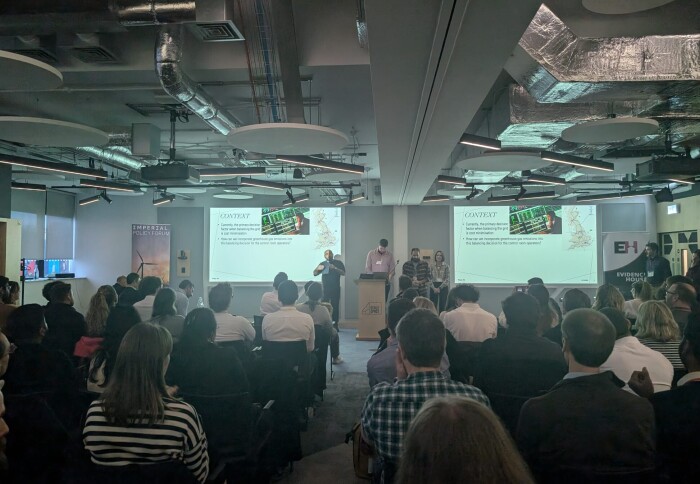Civil servants tackle clean energy challenges at Imperial hackathon

Imperial hosted a three-day climate tech hackathon organised by 10 Downing Street's Data Science team at our White City Deep Tech Campus
This week, Imperial College London partnered with the 10 Downing St Data Science Team (10DS) and Evidence House to host an innovative three-day hackathon focused on the government's national mission for the UK to become a 'clean energy superpower'.
Held at Scale Space, in the heart of Imperial's White City Deep Tech Campus, the event brought together over 100 civil servants to apply cutting-edge AI and data science to some of the UK’s most pressing energy and climate challenges.
The hackathon, co-hosted by Imperial Policy Forum, followed on from the success of April’s Generative AI Hackathon at Imperial’s South Kensington Campus.
The timeliness of the exercise has underscored by the publication, less than 24 hours later, of the government's 'Clean Power 2030 Action Plan'.
Hacking the UK’s climate challenges
The event tasked teams with addressing critical issues, including integrating emissions into energy dispatch decisions, mapping demand flexibility for 2030 decarbonisation targets, and accelerating the uptake of electric vehicles (EVs) and other low-carbon technologies.
Participants formed cross-departmental and multidisciplinary teams to tackle five challenge areas specified by government:
- Integrating Emissions into Dispatch Decisions: Developing tools to optimise power grid decisions for both cost and emissions reductions.
- Demand Flexibility for 2030 Targets: Mapping and modelling how to align energy consumption with low-carbon generation.
- EV and Low-Carbon Tech Uptake: Identifying barriers to adoption and proposing strategies to overcome them.
- Optimising Power Infrastructure: Designing solutions for deploying distributed energy sources like rooftop solar panels.
- Improving Grid Connections: Prioritising renewable energy projects to accelerate grid decarbonisation.

Innovation and inspiration
After days of collaboration and intense problem-solving, the hackathon concluded with team pitches judged by a panel of industry leaders, including: Neel Gulhar, Chief Product Officer of Kaluza; Neil Bush, Head of the UK’s Clean Energy Mission at the Department for Energy Security and Net Zero; Fintan Slye, CEO of the National Electricity System Operator (NESO); and Alyssa Gilbert, Co-Director of Imperial’s School of Convergence Science in Climate, Energy and Sustainability and Director of Undaunted.
The winners of the hackathon, Team 42, developed a tool to enhance how electricity supply is managed across the UK. Currently, grid operators make critical "dispatch decisions"—determining which energy resources should be used to meet electricity demand. These decisions are typically driven by cost considerations.
Team 42’s innovative tool introduces a fresh approach, integrating both carbon emissions and cost into these decisions. By synthesizing data from multiple sources, the tool enables grid operators to assess the environmental impact of their choices. This provides actionable insights to balance cost with carbon reduction, helping NESO (the grid operator) progress toward its ambitious goal of a net-zero electricity grid by 2030.
Team 42 have won the opportunity to present their solution to senior stakeholders at 10 Downing St.
In second place were team Embrace the Chaos, proposing a risk-based approach to optimising grid connections focused on reducing curtailment. Third was Flexperts, who used smart meter data to give granular answers to the question "Where are the EVs?"
The other finalists were: Team 14A2: Analysing factors influencing heat pump uptake; Perf-nect: optimising grid connections, using a range of approaches to identify zombie projects and model a new queue system; and, Make It Personal: Spatially optimising power generation locations, incorporating a range of constraints
Alyssa Gilbert commented: “This hackathon shows the huge potential for collaboration across government to drive progress on the UK’s decarbonisation goals, and highlights the role that universities like imperial can play to inspire innovation, convene a range of actors to develop new ideas, and provide complementary knowledge and skills.”

Article text (excluding photos or graphics) © Imperial College London.
Photos and graphics subject to third party copyright used with permission or © Imperial College London.
Reporter
Craig Whittall
College Headquarters